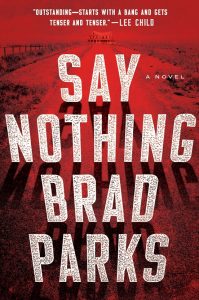
 Brad Parks, a former newspaper reporter, is the only author to have won the Shamus, Nero, and Lefty Awards, three of crime fiction’s most prestigious prizes. Say Nothing is his 7th novel.
Brad Parks, a former newspaper reporter, is the only author to have won the Shamus, Nero, and Lefty Awards, three of crime fiction’s most prestigious prizes. Say Nothing is his 7th novel.
Say Nothing features Scott Sampson, a federal judge who’s held in great esteem. He has a lovely wife and two great kids. One morning, Scott and his wife, Alison, discover that their six-year-old twins have been kidnapped. Scott receives a call warning him to decide exactly as he’s told in a drug case he’s about to rule on. If he doesn’t follow these instructions, his children, Sam and Emma will suffer the consequences. He is told not to call the police, or anyone else. He’s told the Say Nothing.
But the call is only the beginning of a terrible ordeal. The first case is only a test run. It becomes clear, the kidnappers want to influence the outcome of the most high-profile trial of Judge Scott Sampson’s career. The ensuing events are harrowing.
When we last talked, you told me the newsroom has given you enough material for twenty novels. How did the idea for Say Nothing come to you?
I owe my friend Steve Hamilton a debt of gratitude. He gave me some advice years ago. He said, ‘You have to write the book that scares you.’ Ever since then I’ve ruminated about that. One day while I was jogging, I asked myself, What scares me? I’m the father of two elementary school-age kids. Nothing scares me more than the thought of something happening to them—like a kidnapping. I asked myself, ‘Who would want to kidnap my kids?’ From a storytelling standpoint, a ransom demand would be boring. I began considering what kind of character might have something to offer a kidnapper that could not be gotten any other way. And then it came to me: a federal judge might be a good target because he could not be bribed. He’s a moral paragon and the only way to influence him would be to have control of his children. He would then be forced to do the kidnappers’ bidding.
In Say Nothing, Scott Sampson is faced with ethical dilemmas of momentous proportions. Talk to us about the role of conflicting ethical decisions in your thrillers.
Conflict is paramount in many novels, especially in thrillers. However, in Say Nothing, there’s really no decision for Scott Sampson to make. Nothing matters to him but his children. His future, his financial situation, his reputation and his job are all secondary to the wellbeing of his kids. He really has no choice and it’s interesting to see how the decision he must make impacts him in the larger sense. He makes the decision he must, and the question becomes, what will it cost him? As the novel continues, it costs him more and more. Yet, he’s still willing to put everything on the line. He began the book with an ideal life: he has a wonderful job, a lovely wife and healthy children. He has everything a person could want. And then, slowly but surely, every one of those things is taken away.
Say Nothing has been described as a ‘Domestic thriller.’ Define that for our readers.
Different people might have slightly different definitions of a domestic thriller. To me, it’s a thriller in which the protagonist is someone you could meet at the grocery store. It doesn’t involve a superhero with Special Forces training. Rather, it concerns an Everyman or Everywoman. That’s always appealed to me because that kind of character is easy to relate to.
I’ve read a few of your novels. Among other things, they all involve the importance of family. Will you talk about that in relation to the novel?
As a writer, I need an emotional entrée to a book. If I care deeply about the characters and what’s happening to them, I’ll be able to make the reader care, as well. The notion of family resonates with me and with many other people. I could not have written this book when I was single and not yet a parent. Being a husband and parent gave me the insight to be able to write this novel. I’m always writing from a place of personal knowledge. When you get rid of all the trappings of your life, what really matters above all else is family.
Many thrillers involve either a missing person or a kidnapping. These issues seem to hold a special attraction for so many readers. Will you talk about that?
It goes to the heart of the definition of a thriller. Of course, a mystery is about solving a crime, while a thriller is about preventing one. The threat of something awful happening—like someone going missing or being kidnapped—is something we writers use in our writing. The threat must be real to the reader.
For instance, I’m afraid of spiders. I was once sitting in my office and a huge spider appeared on the wall. It was nearly as large as my hand. I tried to kill it with a rolled-up newspaper. But this creature was so huge, it laughed off my feeble attempt and disappeared. So, I was left with this massive spider lurking somewhere in my office. And then, I suddenly felt something tickle my leg. I jumped and screamed. I think thrillers must have something like that spider at their core. So, I’m always looking for that spider.
You mentioned writing from some well of personal knowledge. You’re neither an attorney nor a physician. Yet, Say Nothing involves easily understandable and vivid descriptions of the federal court system and certain aspects of medicine. Tell us a bit about your research for this novel.
As a newspaper reporter, I was no stranger to courtrooms. The law has always fascinated me. For this book, I shadowed a federal judge for a while and learned a great deal about the federal system and the law. I could never have written about Scott Sampson without that access.
The dialogue in Say Nothing is very realistic and highly believable. Tell us about your process for writing dialogue.
It helps that I was a newspaper reporter. I spent years listening to people talk. I learned to listen carefully and to distill the essence of what people were saying. I always looked for quotable moments. When writing, I read my dialogue out loud. I ask myself, is this how someone would talk? It it doesn’t sound realistic to me, I re-do it.
What has surprised you about the writing life?
What’s surprised is that I’ve learned that some of my greatest enjoyment comes from being read by other people. I love getting reader emails such as, you wrote this character…do you know my Aunt Betty? That kind of feedback tells me the reader has internalized my story and fleshed out the character even beyond my own imagination. That shared experience is wonderful and I enjoy that kind of magic.
You’re having a dinner party and can invite any five people, living or dead, real or fictional, from any walk of life. Who would they be?
I’d invite Harper Lee, Thomas Jefferson, Mark Twain, and we might as well have Jesus at dinner. He might have some answers to questions we all have. [Laughter] Then, to balance it out, I’d invite Mohammed.
What would you all be talking about.
I think we’d find universal themes to talk about. We’d realize issues that drove people in Jesus’s time were the same things Mark Twain wrote about and Thomas Jefferson wrestled with when he wrote the Bill of Rights. And those same things still drive us today. So I think the conversation would be about timeless issues of the human condition.
What’s coming next from Brad Parks?
Another standalone for which I don’t yet have a title. It concerns family again. [Laughter] It’s about a woman whose child is taken from her by Social Services. Someone is framing her as a criminal in order to take away her child.
Congratulations on writing Say Nothing, a propulsive, harrowing, and deeply moving novel that kept me turning pages because I had to find out what would happen to this extraordinary family.





 Felix Francis is the son of the late Dick Francis, who was the bestselling author of more than 40 mystery novels. Felix studied physics and electronics at London University and taught advanced level physics for 17 years. Over a number of years, Felix assisted Dick with both the research and writing of his novels. Mary Francis, Dick’s wife, did much of the editing, until her death in 2000, when Felix took over. Dick Francis drew on Felix’s experience as a physicist, and on his prowess as an international marksman.
Felix Francis is the son of the late Dick Francis, who was the bestselling author of more than 40 mystery novels. Felix studied physics and electronics at London University and taught advanced level physics for 17 years. Over a number of years, Felix assisted Dick with both the research and writing of his novels. Mary Francis, Dick’s wife, did much of the editing, until her death in 2000, when Felix took over. Dick Francis drew on Felix’s experience as a physicist, and on his prowess as an international marksman. I recently read
I recently read